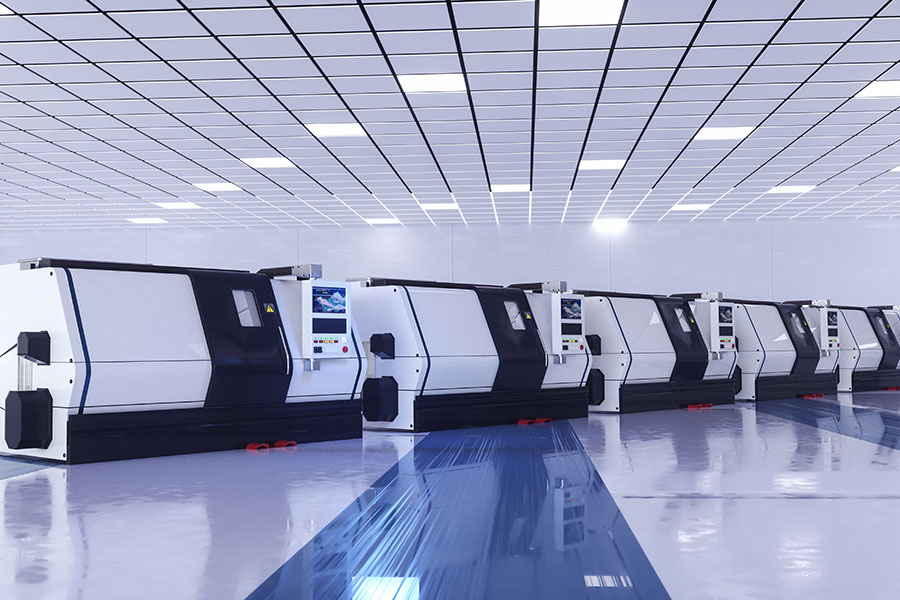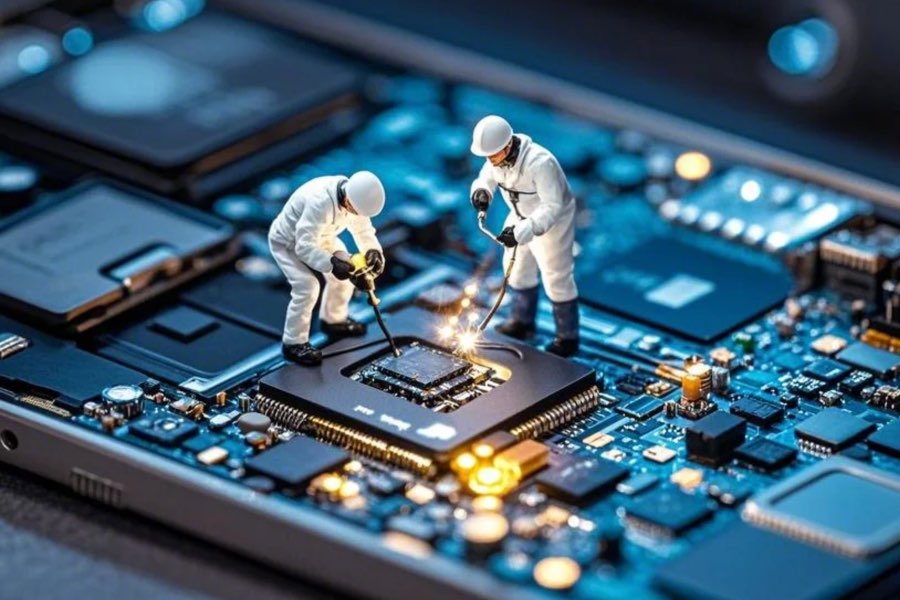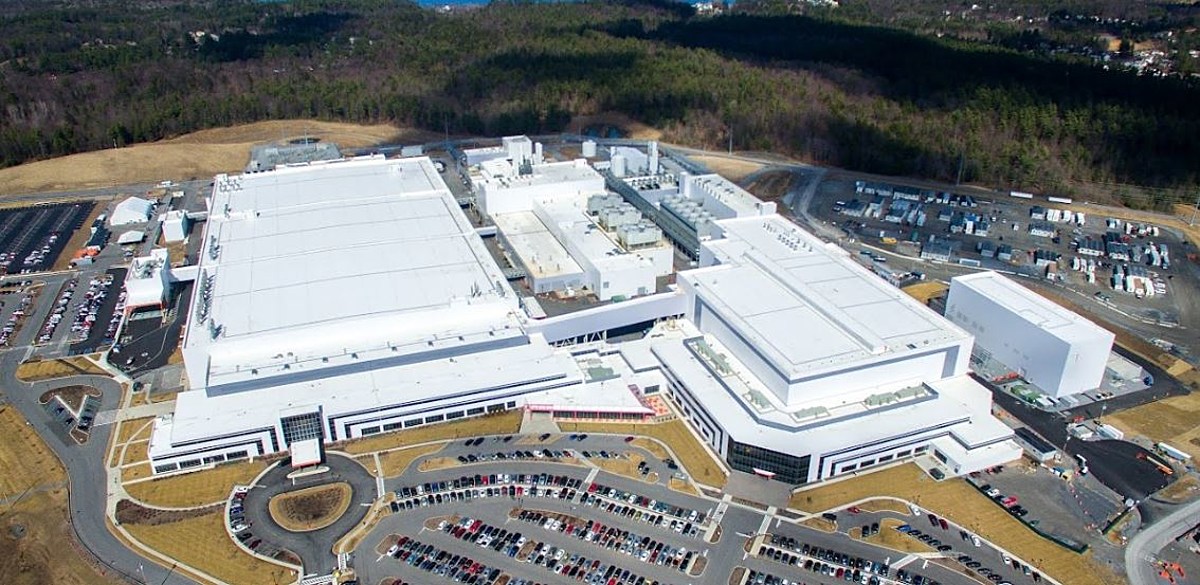在往期的集微访谈栏目中,爱集微有幸采访了欧洲政策中心(EPC)欧洲政治经济项目政策分析师Philipp Lausberg。集微访谈就关于欧洲芯片产业现状、欧洲芯片法案、欧洲半导体发展规划以及市场补贴等一系列问题,收到了十分有启发的答复。

问:相对于世界其他地区,欧盟地区的芯片市场有何特殊之处?
答:首先,欧洲的工业对半导体的依赖程度不如美国和亚洲,因为欧洲更加注重传统工程领域的制造,比如汽车工业、高端机械制造等。从消费和需求的角度来看,欧洲对高端芯片的需求相对较少,当然仍然存在需求,但量不多。这也反映在欧洲的半导体公司市场上。它们是高度专业化的。首先,有大量的研发工作,在这方面欧洲做得很好。比如比利时的微电子研究中心(Interuniversity Microelectronics Centre, IMEC)就是一个非常高端的研究中心。但我认为让欧洲脱颖而出的实际上是一家公司。
这家公司就是荷兰的ASML,它相当于“垄断”了高端芯片制造设备,这是欧洲真正脱颖而出的地方。还有其他一些公司,当涉及到光学、激光等方面时,德国的蔡司(Zeiss)和通快(TRUMF),这些是高度专业化的工业公司,他们提供生产芯片所需的设备部件。但是真正的半导体代工厂却很少——也就是实际“生产”芯片的企业。如果将芯片生产过程分为三个阶段,首先芯片设计,在欧洲其实也不多见高端芯片的设计通常集中在美国,芯片的生产主要集中在东亚,特别是中国台湾和韩国,尤其是在高精尖领域。欧洲在这方面无法与之比较。
当然,封装方面也不是太多,在欧洲的公司组合是高度分化的。还有一点需要补充的是,欧洲生产的半导体倾向于用于汽车和机械设备等领域,而不是用于计算机等方面。它们被称为“后缘芯片”,主要用于工业和终端设备应用,复杂程度比我使用的iPhone或类似设备的芯片低。
问:能否结合欧洲的产业集群的方向来介绍欧洲半导体产学研的发展情况?
答:埃因霍温是欧洲最大的集群之一,主要聚焦于ASML和芯片生产机器开发。像恩智浦这样专注某些领域的代工厂,我认为这是欧洲顶级的集群。IMEC位于比利时,离埃因霍温也不远,整个区域构成了一个大生态系统。我猜德国也在马格德堡试图创造类似的集群。
此外,还有光学器件和机械零件的产业集群,例如蔡司和通快等等。我的意思是有很多这样的公司,这绝对是一个良好的生态系统,他们依赖于参与其中的研究机构和大学,这是一个非常紧密的环境,我认为以这些集群为基础有潜力诞生出新的分支。
问题在于,如果您想要涉足完全新领域,比如建造像马格德堡那样规模的代工厂,那么您已经在很大程度上跳出了集群的范畴。但是我并不是说建立集群中的联系是不可能的,只是这种变化方式并没有像ASML等公司从飞利浦非常自然地发展演变而来显得那样自然而然。
建立集群对于芯片行业的发展至关重要,特别是从欧洲的角度来看。类似“欧洲地平线”( Horizon Europe)的资助计划支持创建商业模式或市场,也支持大学的研究。我认为这非常关键。在欧洲,一个问题是需要进行大量研究,以建立真正能够占据重要市场份额的初创公司,这仍然很困难,还需要做更多的工作。
问:为什么在欧洲芯片法案之前,欧洲在很长一段时间都缺乏对于半导体项目的投资支持?
答:是的,这有两个原因,公共和私人融资。首先从私人融资方面说起,欧洲是不同国家的集合,一个由27个不同国家组成的欧盟。它们都有各自的金融行业,而且在金融服务方面,欧洲不存在一个统一的市场。在所有这些国家中,例如破产税等方面的规定都不同。这就是金融市场没法一体化的原因。而金融市场的一体化才能让其的深度足够为芯片生产提供资金支持,因为芯片生产需要大量的资本投入。
如果要建立一个新的晶圆厂,至少需要100亿美元的投资。因此,你需要大量的融资,而欧洲的私人融资环境无法支撑这种规模的融资。例如,有能力给你筹集超过10亿美元融资的风险投资基金,在欧洲可能只有15个左右,而美国有大约120个以上。
这是一个很大的问题。欧盟现在正试图建立一个共同的金融市场联盟,但进展非常缓慢。因为这涉及到各个成员国之间文化基础、法律以及习俗传统的不同,从而导致在不同的成员国中,涉及到税收、破产和其他各种事项时的不同。基本的问题在于我们没有一个一体化的金融市场。中国的市场很庞大,美国的市场也很庞大,这俩都有庞大的金融市场,受到相同的法律法规管辖,而欧洲却没有这样的情况。从公共融资方面来看,我们也可以看到类似的情况。我是说,首先,在过去30年左右的时间里,在欧洲,产业政策一直具有非常消极的影响。
《马斯特里赫特条约》促进了欧盟的形成,但也引入了严格的规定,限制成员国的财政能力。基本上,这些规定背后逻辑是:欧洲经济将保持竞争,并通过市场而不是产业政策来主导。因为根据法律,各成员国有债务上限为60%,财政赤字不得超过3%。这使得这些成员国无法进行大规模的投资。实际上,基本上法律客观上让,成员国会或多或少禁止产业政策。而且欧盟还有非常严格的竞争法,在成员国层面上,法律基础设施不利于产业政策。而在欧盟层面并没有制定任何东西来填补成员国缺失的产业政策。因此,目前并不存在一个大型的欧洲基金用于投资事项。
当然现在是有越来越多往那边走的迹象,欧洲在这方面的投资规模与美国和中国相比微不足道。我指的是中国对新兴产业的保护和支持以及促进发展的努力。这是欧洲在过去30年中没有真正做到的事情。而美国本来就一直将芯片产业视为战略产业,他们在研发、战略投资和研发机构上布局很多。他们在这方面做了很多工作。而欧洲却缺乏类似的举措。这也是为什么我所在的智库和机构支持建立一个欧洲主权基金,以在整个欧洲范围内为战略产业提供更多投资的原因。
因此,这就是欧洲金融私有市场面对的困境,以及需要采取的措施。因为就目前的情况来看,存在着太多的融资障碍。
问:您认为欧洲芯片法案可能面临的最大挑战是什么?
答:《欧洲芯片法案》有着雄心勃勃的目标,对吧?该法案旨在将欧洲市场份额从目前的9%增加到20%,这意味着生产规模要翻两番,同时还需要大量高度专业化的劳动力,这也是其中最大的挑战之一。
我认为建立这样的劳动力队伍并不容易。欧洲许多行业都面临着专业化劳动力短缺的问题,包括绿色产业和其他战略领域。在芯片行业,所需的专业知识水平往往更高。我认为这可能成为一个瓶颈。此外,当然欧盟希望建设更多的晶圆厂,增加更多产能。其中一个原因是考虑到战略自主权,这很正常,但问题在于目前芯片制造的规模并不是很大。
所以专家需要进一步培养。我们现在看到,许多外国公司受邀前来,比如英特尔在德国的投资数额高达170亿,而德国政府也将再投资约100亿。从长远来看,这可能会有助于在欧洲本土发展专业人才,也能吸引外国专家和公司加入。但本质上还是和自己从零建起整个产业链有所区别,尤其是在增加战略自主权的想法下。
芯片法案存在的问题是,和任何产业政策计划一样,在生产规划或生态系统规划方面,有一些事情可能会出错,因为它们本质上都是纸上谈兵。例如,如何正确评估需求和供应。在过去50年中,芯片行业以产能过剩导致供应过剩而闻名。即使在私营部门,许多企业也会破产,这种情况在欧洲也可能发生,尤其考虑到来自亚洲的激烈竞争。想要与之匹敌是非常困难的。
同时,为了生产出成本效益高、在市场上具有竞争力的芯片,欧洲目前面临着高能源价格的问题。这也导致了它们在竞争中的劣势。所以,我认为这些都是需要考虑的问题。我认为,与其仅仅出于战略自主性的考虑选择在欧洲制造芯片,还不如更注重芯片生产过程的上游部分,如设计和研发更合理。
同时,与那些专注于生产的国家建立更紧密的贸易联系也是一个方向。我认为这些是制定芯片法案时需要考虑的一些因素,以及可能威胁其成功实施计划的问题。此外,我还想说的一件事是,《芯片法案》计划在欧盟层面提供110亿欧元的资金,但它也希望动员大量私人资金,而且《芯片法案》严重依赖国家援助。国家援助意味着欧盟成员国有权绕过产业政策不能由成员国制定的旧观念,可以更多地进行直接投资。
例如目前德国正在马格德堡投资建设一家芯片工厂。但这也引发了一个问题,即欧盟中较富裕的成员国比那些资源不足或已严重负债的国家拥有更多的能力和资源。这可能在欧洲内部造成不平衡,并危及统一市场。统一市场的理念是确保公平的竞争环境,而破坏这一原则非常危险,因为统一市场同时也是欧洲最大的资产之一,它是一个拥有4亿人口的市场,能够在公平竞争的条件下展开竞争。这确实创造了效率和规模经济,这对于建立成功的企业至关重要。所以,问题在于回到资金方面,建设芯片工厂不应过度依赖国家援助。如果过度依赖国家援助,则会出现我刚才提到的这些问题。
问:欧洲芯片法案希望能在 2030 年将欧盟在半导体制造领域的全球市场份额从 9%~10% 提升至至少 20%,您认为这可行么?
答:我认为这会是一个具有挑战性的目标。目标已经确定了,但能否实现还很难说。这实际上也取决于芯片行动计划的推动效果以及私人资金的投入程度。目前,欧盟层面的公共融资只有110亿欧元,成员国可以提供更多的资金。但这些新兴产业或新的代工厂能否运作良好还有待观察,他们融入市场的情况如何?他们是否能够迅速盈利,或者是否需要依赖更多的补贴?所有这些因素都对实现目标产生影响。我认为半导体市场可能是一个最复杂且充满不确定性的市场,因为它有很多瓶颈和限制因素。即便在技术发展方面,有时候也很难预测。比如在80年代,日本曾经拥有主导地位,然后由于没有重视个人电脑芯片而再次失去了优势。事情是多变的,我们无法预料。我估计这是一个非常雄心勃勃的目标,想做到不是不可能,只是不容易。
问:欧洲领先半导体公司生产的大多数类型芯片都没有受益于尖端制造,欧洲缺乏尖端芯片设计的原因是什么? 欧洲是否有必要建立更加完善的无晶圆厂生态系统?
答:是的,这也是一个问题,如果你建立这些尖端芯片工厂,但却没有需求。正如我在开头所说的,欧洲产业并没有像苹果和索尼这样需要这些高端芯片的大客户,尽管技术发展正在推进,汽车行业和其他在欧洲很大的行业也会越来越需要这些芯片。但我认为这又回到了我在开头提到的一点,目前在欧洲生产的更多是用于汽车工业或其他工业应用的相对简单的芯片,基本上就像这个后缘芯片。
我认为主要问题确实是你所说的战略自主权,我们太过依赖他人,而芯片对于我们来说是如此重要。当然,即使是高端芯片也是必需的,我只是说市场可能不像其他一些国家那么大,但仍然需要这些芯片。
而且,我认为新冠疫情危机确实表明存在很多脆弱性,供应链被打乱。这就是为什么如果你想快速建立自己的产能,那么邀请来自其他国家的公司也是有意义的。正如他们所说,邀请那些能够在同一水平上共同合作的盟友国家。我认为这就是背后的原因。
说实话,我认为这对欧洲来说也是一个非常有趣的市场细分领域,因为欧洲的实力、研发能力以及拥有高素质的劳动力。而且这也是市场中利润率最高的领域之一,对吧?
我相信肯定有充分的理由在这方面进行更多投资。从经济环境、生态系统角度来看,我认为这将是最明智的一步,如果你想拓展已有的业务,这样会更容易。我不是说这件事本身很容易,因为这也是一个非常复杂的行业。但与在欧洲建设芯片工厂相比,这可能更符合欧洲的优势,因为晶圆厂制造在欧洲并没有发挥很大的作用。
问:有声音认为欧洲芯片法案过分重视引入外国或本地大型半导体企业,对本土中小企业扶植不足,您怎么看?
答:我认为我们需要同时做两件事情,因为如果我们想认真地对待战略自主性,我们需要建立制造能力,而这需要快速完成,对吧?这不是一件你可以慢慢来的事情。而最简单的方法就是邀请外国人,因为他们拥有专业知识。我认为事情就是这么简单。但同时,我也认为我们应该支持欧洲的初创企业,但同样,你需要选择,如果你制定产业政策,你不能以支持所有东西的方式来做,你需要设定优先级。比如说如果涉及到欧洲已经擅长的芯片,如我之前提到的后缘芯片等等。
我认为在那里进行更多的制造是有意义的,因为这正是疫情期间供应链中断所导致的问题。甚至现在汽车行业仍然受到了极大影响。因此,也许应该更加关注这个方面,但这是整个问题的关键是一定要有的放矢。直接在欧洲建立完整的价值链,要我说这是幻想,这几乎不可能,尤其是半导体行业是世界上最复杂的行业之一。如果您看一下中国台湾,在过去的30年或40年中,他们如何建立自己的专业知识,这很难复制,ASML 也是一样的道理,你没法简简单单就能复制它,我认为这也是中国想要拥有更多该技术的原因。但从头开始建立专业知识是很困难的。
因此,如果您可以依赖开放市场,我认为在一定程度上是可能的,当然现在这取决于当前更紧张的地缘政治环境,您需要确保您的合作伙伴是可靠的。但总的来说,我认为仍然有潜力依赖于开放市场。所以这就是为什么你仍然应该从思考什么是自己最擅长的地方开始,否则你就不具备竞争力。
问:有人认为对芯片巨头进行补贴会使其过分依赖补贴本身,从经济上来说难以持续,欧洲芯片法案应该如何可持续地刺激本土芯片产业的发展?
答:现在我们生活在一个补贴日益成为常态的世界中。如果你想与美国和中国等大国竞争,就无法避免使用更多的补贴。这是绝对明确的。我认为,尤其是如果你想在更具对抗性的地缘政治环境中拥有更多战略自主权,那就同时应该尝试专注于自身擅长的领域。这涉及到产业政策和贸易政策的综合运用。
所以,在你的专长不足或没有太多专业知识的领域,比如芯片价值链的某些环节,我认为肯定是有符合这种情况的,也许更多依赖于贸易政策并与可信赖的伙伴合作可能会更有意义。然而,我同时也看到了在马格德堡设厂的担忧。比如,在德国,有很多批评,因为我不知道在那里投资了每个雇主或雇员多少百万欧元,这听起来有些疯狂,但同时,如果你想要在某种程度上实现战略自主权,那么这就是必须的操作。
你需要能够说出投资的价值有多少。例如,看看德国经济在面对高能源价格方面的冲击下有多糟糕,你可以说,也许现在这样做要付出昂贵的代价,但以后它可能实际上会证明是正确的。因此,我的观点是,是的,这可能涉及大量补贴。但我认为,在一定程度上是合理的,只是不应该过度。把别地已经存在的供应链在重新在本土从零复制一遍是没有意义的,所以重点在于如何把补贴维持在一个合理的维度。
我认为法院委员会的目标也是如此。他们说达到全世界份额的20%,也就是20%的市场份额并不足以覆盖欧洲在芯片方面的全部需求,尤其是在地缘政治危机发生时。但这将减轻后果,如果情况变糟的话也能缓和一些。所以,我认为这确实是权衡不同利弊的问题,然后找到一种合理的妥协。我认为这也是委员会正在努力做的事情。
问:SIA 发布报告称针对增加半导体晶圆厂会在美国造成严重的人才短缺,欧盟会如何试图克服此类问题?
答:我认为这是一个非常好的倡议,因为归根结底,当涉及到半导体时,这一切都与高度专业化的专门知识有关。我认为这很棒,但我认为欧洲目前并不具备实施类似计划的条件。因为在教育方面,成员国仍在做很多工作。所以,你必须为欧洲制定倡议。委员会在这方面可以有一些倡议。但委员会在推动这一点上所能做的事情要少得多,因为成员国也能单独行动。这就是为什么你会看到像德国这样国家在自己做。此外,在欧洲有很多不同的语言,但建立一个共同的培训计划变得更加困难,还有各种不同的学术传统和研究传统。
所以,我认为美国正在做的事情很好。比利时的微电子研究中心 IMEC,我想是这样叫的,已经有一些很好的倡议了。但我也看到了欧洲在这方面的局限性,我认为需要更多的努力来真正集结倡议。但我看到这比起美国或中国来说更难实现。
问:对于受资助企业的供应限制是否会削弱全球半导体供应链的韧性?
答:我认为这是因为第三章实际上是关于紧急情况的。这不是一项容易实施的政策。我认为委员会对此非常清楚。当然这在行业中引起了关注,因为正如你所说,其他国家可能会做出反制措施。因为正如你所说欧洲芯片法案所做的是要求那些从补贴中受益的晶圆厂首先供应欧盟的工业企业,这就相当于出口管制。还有委员会联合采购芯片的举措。
但我认为主要问题在于出口管制。但是其他国家,也会采取同样的措施。问题在于他们没有将这些写入法律。一旦某些规定以法律形式确定下来,那么这就会惹人联想。我认为这就是争议所在。问题在于欧盟像是一个由各个成员国组成的集合体。如果你不在法律中明确规定某些事项,一旦危机来临,各成员国就会有不同的利益,进而很难取得进展,这就是他们这样做的原因。但是总的来说,我认为这并没有什么特别之处。我认为每个国家都会采取类似的行动。问题在于它会导致不确定性或者让有些国家产生自己供应链会被因欧洲芯片法案切断的预期。
我认为这就是问题所在。我理解他们这样做的原因,我认为类似的事情最好是在危机发生时以对话的方式进行。但是,由于涉及27个成员国,这非常困难,所以从这个角度来看,我认为使用这样的工具是有道理的。
以下是采访原文(英文):
Q:What makes the chip market in the EU region special compared to the rest of the world?
A:Yeah, so first of all, Europe's industry relies less on semiconductors than the US and Asia, because where there's more engineering of the old that type kind of industry, manufacturing of high-end machines and things like that, so in general, also already from a consumption perspective, from a demand perspective, there's less demand for high end chips in Europe, of course it is, but it is less. And that also reflects what we see in the market of semiconductors companies in Europe. They are highly specialized. So, you have, first of all, I mean there's a lot of R and D, so there's a lot of research being done. Europe is good at that. You have this IMEC in Belgium that the research center that is very high end. But I think the biggest sort of standout factor for Europe is basically concentrated in one company.
And that's the Dutch company, ASML that produces as a virtual monopoly, you could say, on high end chip manufacturing machines, that is where Europe is really sticking out. There are other companies like,But also, when it comes to optics and to laser and things like that, you have Zeiss in Germany have tons. These are highly specialized industrial companies that provide parts of the equipment that you need for producing chips. But there is little of actual foundry. So the production of chips, if you want to divide the process of chip production in three ways. And you get the design, which is also not a lot of that in Europe. The sort of high-end design is very American focused. Then the production, which is in East Asia, mainly in Taiwan and south Korea, especially when it comes to the high end of the leaders. And there's nothing comparable in Europe.
Of course, the assembly is also something that's not much. It's a highly specialized set of companies that Europe has. And it's also one more thing I should add. The semiconductors that are produced in Europe tend to be the ones that you use in cars and in machinery and not the ones using computers so much. It is what you call trailing edge chips that is used for in industrial and ultimate motive applications. They tend to have a lower complexity than the ones that I use, for example, for an iPhone or something like that.
Q:Can you introduce the development of European semiconductor industry, education and research in combination with the direction of European industrial clusters?
A:I mean that the Eindhoven is one of the biggest clusters, and I mean it's all built around more or less about ASML and the production machine development. You said there are some foundries as well like NXP, I take it they are very specialized. I think this is the top cluster in Europe, of course. IMEC in Belgium, it's Eindhoven and it's not far away either. It's really one big ecosystem there. I guess what the Germans are trying to do in Magdeburg is a bit similar you have.
But then you also have the optics, clusters and the ring gear, for example, with size and card size and so on. You have Tom which is in Bond written back. Yeah, I mean there is a lot of these companies that and it is a good ecosystem for sure absolutely, and they rely on research institutions and universities that are involved. It's a very the tightly-knit environment. That's for sure. Yeah, I think there's definitely potential to sort of branch out of these clusters a little bit.
The thing is, if you want to go into something completely new by building like what's happening Magdeburg that building foundries of that size, then you stepping out of the cluster quite a bit already, but I mean I’m not saying that it's impossible to build the links they are there, but it's a bit less of the organic approach than, as you said, for example, ASML grew out of Phillips. It is a very organic development there.
But I mean building clusters is decisive for building chips industry for sure, from the European, from the European level, I mean there's Horizon Europe funding which supports the creating business models or market for, also for research that comes out of universities. And I think that's very key. In Europe, one of the problems is that there is a lot of good research to make, to build startups that can then actually conquer a large amount of market share. That's difficult still. That's, I guess, also where more needs to be done.
Q:Why did Europe lack investment support for semiconductor companies for a long time before the European Chip Act?
A:Yeah, I mean there are two reasons for that, public and private finance, and starting by private finance, Europe is the, EU is a collection of different states, 27 of them. And they all have their individual financial industry. And there is not a European market for financial services. They are different rules when it comes to insolvency tax and so on in all of these countries. That's why there is no integration between financial markets. Integration is what makes financial markets deep and makes them deep enough to finance chips, because chips production is highly capital incentive.
If you want to build up a new fab, it's 10 billion or something at least. So, you need huge amounts of financing, in the private financing environment in Europe doesn't deliver that kind of finance. If you look at, for example, venture capital funds that can get you of more than 1 billion, you have, maybe like 15 in Europe and the US have 120 or something.
This is a big problem. What the EU is trying to do is to build a common financial markets union, but this is going ahead very slowly. You have, because it touches upon very fundamental, legal tradition that you have. And in the different member states, when it comes to tax, when it comes to insolvency, when it comes to all sorts of other things. But it's basically the problem here that we don't have an integrated financial market. China is huge, US is huge, you have huge financial markets all under the same legislation, and Europe doesn't have that. If when we look at the public financing, we see something similar in a way. I mean first of all, Europe has been, in Europe, the work of industrial policy has been, has had a very negative ring to it over the past 30 years or so.
The Maastricht Treaty which led to the Europe, but also introduced strict rules on how much that member states can make. They basically were built on the idea that the European economy will be competitive and will rule through the market and not for industrial policy. Because if you have, basically, what happened is that you have these debt ceilings of the 60%,3% limited deficit spending for individual member states that doesn't allow those member states to make huge investments. So, basically by law, industrial policy more or less was forbidden by member states. It had very strong competition law as well. The legal infrastructure was tilted against industrial policy. And on the member state level, I mean at the same time, nothing was built on the EU level. on the EU level, to replace that lack of the industrial policy on the member state level. So, there is no big European fund that invests in things.
Now there is more and more of it, but it's nothing compared to the size of what the US and China are doing. I mean better than I do, but I mean China has taken an approach of developing infant industries, protecting them, subsidizing them. And so on. This is something Europe hasn't really done in the past 30 years or so. The US when it comes to chip industry, have always seen it as a strategic industry. They've invested a lot for the dark party in their development, strategic investment or development agency. They have they've done a lot there. And this is something you're blacks. And that's also why my think tank, my institution, we're in favor of building a European sovereignty fund that can then provide a more investment in strategic industries on a European level.
So that would be that and the development of private, the European financial markets. This should be done to alleviate that. Because as it stands now, there are too many barriers for sufficient financing.
Q:What do you think may be the biggest challenge facing the European Chip Act?
A:I mean the European Chips Act, it has very ambitious goals, right? So, it aims to increase the market share of European production to 20% from currently 9%, which would involve quadrupling basically the production figures, but also the workforce that this is very highly specialized workforce, which brings me to one of the biggest challenges.
I think building that workforce will not be easy. Europe is suffering from a shortage of specialized labor in many sectors. There are not enough workers also in green industry and a lot of other strategic areas. In chips industry, the level of expertise you need to develop is even higher often. I could imagine that is a bottleneck. Then I think initial is because now the US wants to build more fabs, wants to build up manufacturing capacity. One of the reasons are considerations of strategic autonomy, which it makes sense, but the problem is that there is not that much manufacturing of chips going on at the moment.
So the expertise in that first needs to be further developed. What we see now is that there's many foreign companies that are invited to come over like Intel in Germany who invested to something like 17 billion. And the German state is putting another up around 10 billion as well. So, this is, on the one hand, I think in the long run, this is probably, you know that can help to develop expertise also in Europe to invite these foreign experts companies in. But it's not the same as if you build your own industry, especially when the idea is to increase strategic autonomy.
The issue with this chips act is that with any industrial policy program, there are certain things that can go wrong when it comes to planning of a production or planning an ecosystem, that if you believe on the drawing board, so for example, how to evaluate properly demand and supply, The chips industry in the past 50 years has been famous for having a moment of gluts of chips production where then there was too much supply. And I mean even in the private sector, a lot of adventures had to go, were going bust, went bust, and something like that, of course, can happen in Europe too, especially considering the very high competition that exists from Asia.I think it's just very hard to match that.
And then also to build the chips in a way that they are cost-effective, that they are competitive on the market. In Europe at the moment has problems with high energy prices. And that also makes them less competitive. So, I think these are all things to consider. I believe, while there is a case to be made to build chips in Europe just for strategic autonomy reasons, I think it probably would also make sense to focus on the more upstream parts of the chips production process, meaning on design and research.
At the same time, building stronger trade links with those countries that focus on production.We will see what happens, but I think these are some of the considerations when it comes to the chips act and what could go? where the threats could be to make this a successful program? And maybe one more thing I should mention as well, the chips act year marks 11 billion on EU level financing, but it hopes to mobilize a lot of private financing as well. And it really relies on state aid. And state aid means that member states of the European union allowed to, in particular, allowed to sort of circumvent the old idea of that industrial policy should not be made by member states, but that they can invest more in directly.
So like Germany is doing right now with the chips factory in Magdeburg. But that has also the issue that richer member states of the European union have much more capacity, the capacities to do so than then those who are don't have the same resources and those who are already highly indebted. So that can create imbalances within Europe, and it can endanger the single market where you the single markets ideas that you have a level playing field where competition is just an equal and disrupting that is a very dangerous move, because the single market at the same time is one of the biggest assets that Europe has, because it is a market of 400 million people and being able to compete there on a level playing field. It really creates the kind of efficiencies and the economies of scale. And that are important to build successful companies. So, the problem here is going back to financing that it should not rely too much on state aid. And if it does, then you have these kinds of issues that I just mentioned.
Q:The European chip act hopes to increase the US global market share in semiconductor manufacturing from 9%, 10% to at least 20% in 2030, you have already mentioned. Do you think is that is this feasible?
A:I think it's going to be challenging. I mean it's going to be challenging, and I think it's a goal that's out there. But if we reach it or not, that it's very hard to say. It really also depends on how well the initiatives work that chips act is pushing ahead, how much private finance will actually jump on that? How much because the public financing now is I mean from the EU level, it's just 11 billion, and member states, they can dish out more money. But and then the remains to be seen how well these new industries or new fabs actually work? How well they integrate into the market? Are they able to become profitable quickly? Or do they have to rely on more subsidies? All these kinds of things play into that. And I mean the semiconductor market is, I guess, one of the most unpredictable markets out there because it's so complex. And there's so many choke points. But also, when it comes to the development of technology, it's sometimes quite unpredictable, yourself or the Japanese used to have the commanding position in the 80s. And then they are sort of like, they didn't bet on the on the personal computer chips and then lost their position again. So, things can happen. We don't know. my estimation is that it's a very ambitious goal. It's not impossible, but it will be difficult.
Q:For what reasons is Europe lack of cutting-edge chip designs? Is it necessary to build a more full-fledged fabless ecosystem in Europe?
A:Yeah, I mean that's also an issue, that if you build these cutting-edge chips, foundries, and then you don't have the demand. As I said at the beginning, the European industry, it doesn't have a lot of Apple and Sony and things like that need these very high high-end chips, even though technological development is advancing, and even the car industry will need more and more of that and other industries that are big in Europe. But I think it comes back to the something I said at the beginning that currently what's being produced in Europe is more than a bit less complex chips that are being used for the car industry or other industrial applications. It's like this trailing edge chips basically.
I think the main issue really is that of strategic autonomy that you say, we are depending so much on others for something as vital as these chips. And course, they are needed even the high end once I’m just saying the market is maybe not as big as it isn't in some other countries, but they needed.
And you don't want to, I think the Covid crisis really demonstrated that there's a lot of vulnerabilities, supply chains are being disrupted. That is why if you want to build up your own capacity quickly, then it also makes sense to invite companies from other countries. As they would say, sort of allied countries that can build this on I level. So I think that's the reasoning behind that.
I think that to be honest, I think that's a very interesting market segment also for Europe because of Europe’s strength and R and D and a very qualified workforce and so on. And this is really also one of the segments of the market that makes one of the highest profit margins, right?
I believe that there is definitely a case to be made to invest more in that. I think it would be the economically from the economic environment, from the ecosystem Europe, it would be the most and the most sensible step to do, I think, if you want to branch out from what is already there, it's easier. I mean I’m not saying easier because it's a highly complex industry as well. But it might be closer to Europe strength than building up fabs, which it's something that has never really played a very big role in Europe.
Q:There are voices that the European chip x plays too much emphasis on the attracting the foreign big chip makers, such as Intel and TSMC. Instead of frustrating the local startups, do you believe this criticism have a point?
A:I believe that you need to do both, because if we want to be serious about strategic autonomy, we need to build up a manufacturing capacity and that needs to be done quickly, right? It's not something that you can. And that's the easiest way to do that is by inviting foreigners. It's because they have the expertise. I think it's as simple as that. But at the same time, I do believe that we should also support the European startups, but again, you need to choose, if you do industrial policy, you can't do it in a way that you just support any everything, you need to set priorities. These priorities, I mean there's a certain if it comes to the chips that Europe is already good at the that I mentioned before for the trailing edge chips and so on.
And I think it makes sense to also have more manufacturing there, because that is exactly what the supply chain disruptions during Covid, and even now still affected very badly the car industry, for example. So, maybe focus on that a bit more, but it really needs to be focused. That's the whole point. And just trying to build up the entire value chain in Europe, I mean that would be a fantasy to say that it's possible, especially it's one of the most complex industries in the world. It's something, if you look at the Taiwan, how long the over the past 30 years or 40 years, they build up their expertise. And it's so hard to replicate as the same with ASML, I mean you can't just go, and I yeah, I guess it's the case where China, for example, would like to have more of that technology. But it's hard to build that from scratch.
So if you can rely on open markets and I think to a certain extent, I mean we can, it depends now with a more tense geopolitical environment that you want to make sure that your partners are reliable. But in general, I think there's the potential to still rely on that. So that's why you should still start from the idea, somehow that you should focus on what you are best at, because otherwise you won't be competitive.
Q:How should the European Chip Act sustainably stimulate the development of the local semiconductor industry?
A:I mean the thing is now we are living in a world where subsidies are becoming more and more the norm. If you want to compete with the big players like US and China, you won't be coming getting around using more subsidies. It's absolutely clear. I think, and especially if you want to have more strategic autonomy in a more confrontational geopolitical environment. But I think that's why, as I said before, I think you should at the same time, try to focus on what you already good at. It's a mix of industrial policy and trade policy.
So, where you can, where you are quite far behind or where you don't have much expertise. And that is parts of the chips value chain. Definitely, I would consider to be falling under that label, then it might make sense to rely more on trade policy and work together with trusted partners. So, but I mean at the same time looking at mark the board and so on. I mean there's a lot of criticism of that in Germany, because of, I don't know how many million euros cities per employer, an employee that has been invested there. It sounds crazy, but at the same time, if you want to be serious about a certain degree, at least of like a strategic autonomy, then that's what you need to do.
And then you need to be able to say how much is that worth to you. You know, for example, look at how bad the German economy is coping with the high energy prices, if they had not outsourced the entire energy to Russia, they would be in a better position now, so you could say, maybe now it's expensive, but later on it might actually turn out to be the right position. So, my whole take is, yes, it might involve a lot of subsidies. But I think to a certain level, it's justified. You just shouldn't overdo it so to say I mean, if there is no point in building up entire industries from scratch to replicate things that exist elsewhere, it's just about having like a certain level.
And I think that's what the court commission also tries to do. They say 20%, I mean 20% of the market is not, there won't be enough to completely deliver everything Europe needs in terms of chips. In case, there is a geopolitical crisis. But it will make the fall. And they come down a little bit softer if things are going badly. So, I think it's really a matter of weighing different pros and cons and then arriving at a sort of reasonable a compromise. And I think that's also what the commission is trying to do.
Q:okay, my next question you have mentioned before, because currently in America, quite a few economic agencies join the network to institutions, to help build a semiconductor workforce. What's your opinion on this training problem? Do you have the same plan or already have the better plan regarding to semiconductor workforce building?
A:I think this is a very good initiative, because in the end of the day, when it comes to semiconductor, it's all about highly specialized expertise. And I think it's great, but I think Europe is not in the position to do something similar right now. Because it's very much when it comes to education, there's a lot being still done by member states. So, you would have to create European initiatives for skills and their European. The commission has some initiatives there. But there is much less the commission can do to really to push that ahead, because the member states are largely empowered to do that themselves. So, you will have more like a German sort of push for it. Also, there's how many different languages there in Europe, but it's just harder to build like a common training program and very different academic traditions and research traditions too.
So, I think it's great what the US are doing. Now the Belgian the Belgian research center, IMEC, I think it's called, I mean that's already there are some great initiatives for sure. But I also see the limitations that Europe has in this respect and I think more needs to be done to really bundle initiatives there. And, but I see it's harder to get this through than, let's say, if the US or China are doing.
Q:Do you think the crisis response toolbox (such as export authorizations and Priority-rated orders) will contribute to the resilience / rɪˈzɪliəns / of the global semiconductor industry?
A:I think this is really that the third chapter is really about emergency situations. It's not something that will be easily applied. And I think the commission is also, they're very clear about that. Nevertheless, in the industry, it causes concern because, yeah, as you say, there could be a reciprocal reply response from other countries. If you, because I mean what they are basically doing is saying that those foundries that have benefited from your subsidies, they need to then supply EU industries first, and then also that's amounting to export controls. And then the joint procurement of chips by the commission.
But I think the main issue is about the export controls. And I think the problem here is that other countries,they would do exactly the same. The thing is they don't write that into their laws. If you write laws, then you create expectations. And I think that makes it so controversial. The problem here is that the EU is like a collection of states. And if you don't write something in law, its member states will have different interests once the crisis comes. And then it will be hard to move ahead. So that's why they do that. But I think in general, this is nothing super special. I think every country would act in that way. The whole problem is that it creates insecurity or some sort of expectations that some countries that you will be cut off from supply from elsewhere.
I think that's the problem with it. I do understand why they put this in place. I think something like that ideally would be done more a, more a talk when a crisis hits. But again, having these 27 states, it's very hard, so I think in that respect, yeah, I think there is a justification for an instrument like that.









